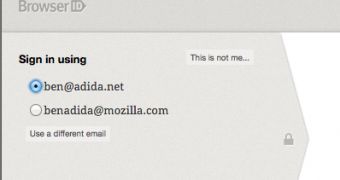Mozilla's login technology, BrowserID, is coming along nicely, as always. The group has set a rather lofty goal for itself with BrowserID and no much time to do it, so the progress is encouraging.
BrowserID, which is designed to replace traditional, universal login services such as Google Accounts, Facebook or even OpenID, has gotten a couple of features that website owners and users are going to enjoy.
For one, there is now the option of remaining logged into a site that uses BrowserID. Websites have to enable persistent sign-ins for this to work and users have to specify that they want their credentials stored, but the feature makes sense for sites that you visit often, several times a day even.
BrowserID already simplifies the login process, by not requiring you to enter a username and password every time you visit a page, but you still need to authorize the site to use your credentials every time. With persistent sign-ins, this step is eliminated as well.
Another feature added to BrowserID recently makes life easier for websites. Most people use several email addresses for different purposes. BrowserID supports and even encourages users to add several email addresses to be used for identification.
However, this can create problems when a website needs you to be tied to a specific email address.
"For example, if Alice shares a photo with Bob using a BrowserID-enabled photo-sharing site, the web site needs to authenticate Bob against the exact email address Alice used to invite him. With this new feature, Bob doesn’t need to type his email," Mozilla's Ben Adida explained.
"Even better, Bob isn’t misled into using an email that will lead to an authentication dead-end because it’s not the email Alice used to share the photo with him," he added.
Finally, Mozilla has updated the digital signature algorithm in BrowserID making it much faster. Mozilla boasts that the speed gained was enough for it to start using a larger key, for better security, while still making the entire process faster than before.

 14 DAY TRIAL //
14 DAY TRIAL //